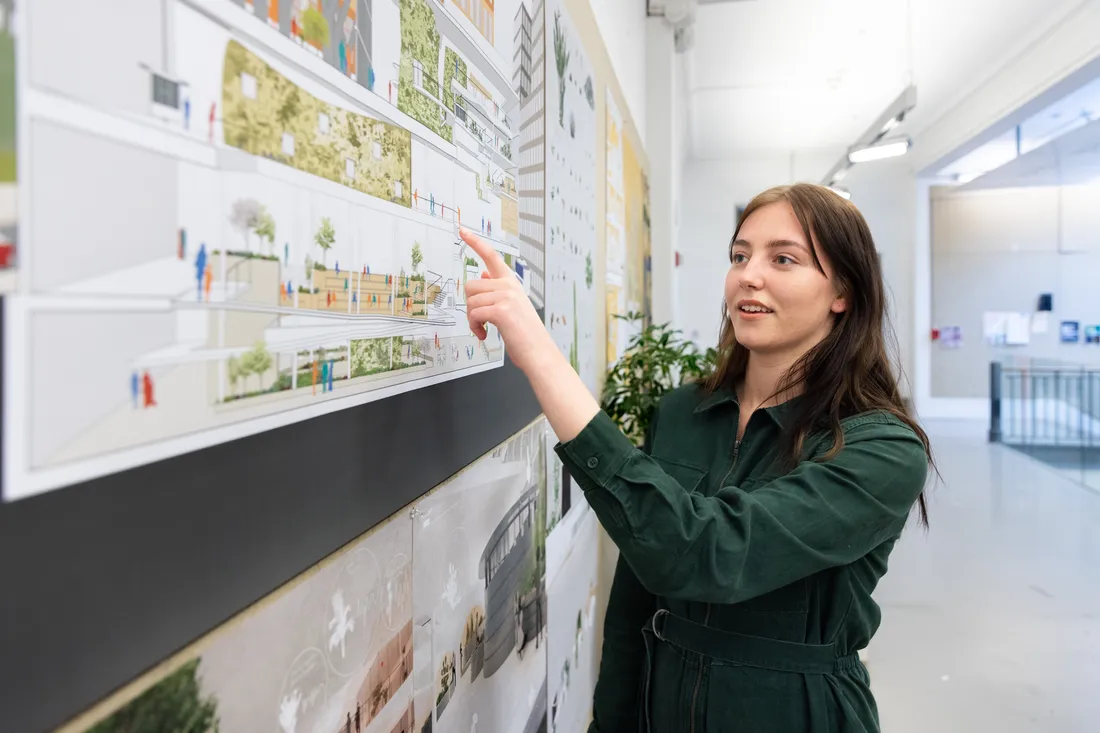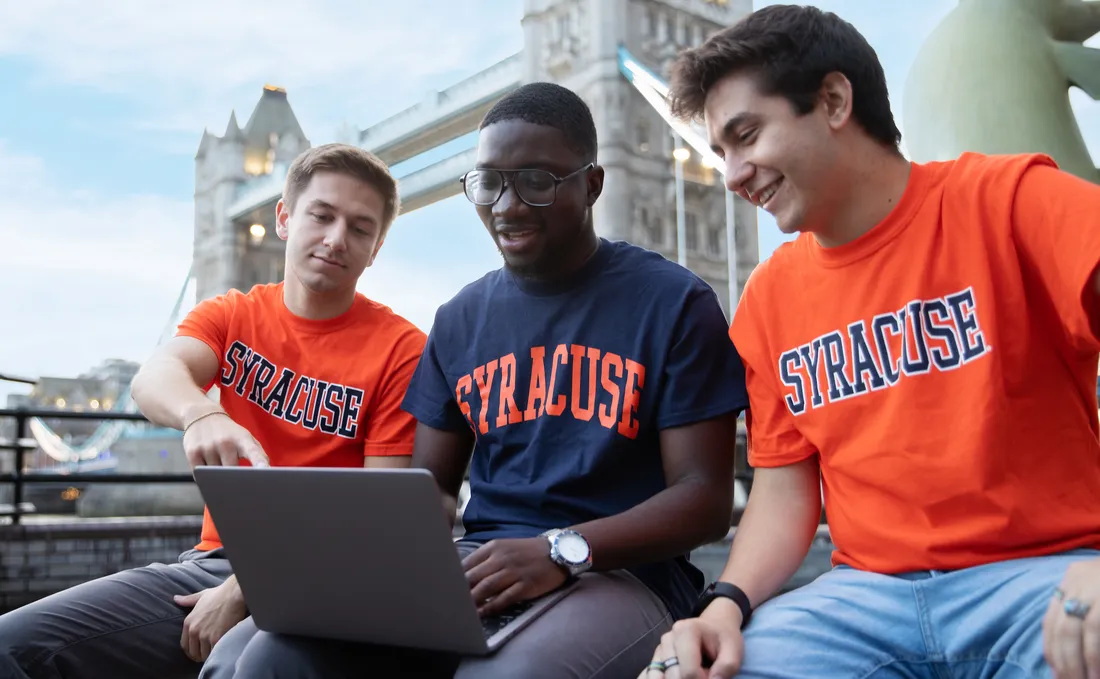
Jenna Merry ’23 (right), Pramita Mital ’23 and Matt Gilligan ’23 in Florence, Italy.
Lately, while architecture student Jenna Merry ’23 takes in the beauty of Florence’s soaring churches and cobbled squares, her thoughts sometimes drift to nuclear fission and waste disposal. After she and her studio partner, Madeline Alves ’23, learned that nuclear waste is a pressing concern in Italy, they decided to design a disposal facility as their project for the semester. These designs will be submitted for review by professionals currently working on this problem, thanks to their professor's connections in the industry. “It’s inspiring to be working on something that’s so relevant, and amazing to think we may have an opportunity to be part of the conversation,” she says.
Merry, who arrived in Italy in March, is part of the first cohort of Syracuse University students to study overseas since Syracuse Abroad programs were suspended last year as a precaution against COVID-19. Nearly every student in the School of Architecture participates in at least one of the University’s immersive academic programs abroad. Florence is a compelling option for many because it provides unparalleled experiences of historic architecture and art within a cosmopolitan hub of business and education. The University’s Florence Center is the first study abroad establishment of its kind in the city. Students from around the world are drawn by its reputation and long-standing connections with renowned scholars and diverse institutions throughout the region.
I loved that we have the chance to start in studio our first year and gain hands-on experience right off the bat. Then in our fifth year, when we focus on a thesis and collaborate with faculty, we get a great transition to the working world.
Jenna Merry ’23
Many aspects of Merry’s Florence experience would be familiar to those who have studied there in semesters past. Her curriculum delves into history, art, design, and Italian language and culture. She’s making new friends over shared meals and spontaneous adventures in the city, and loves the deep connections forged among those who share the abroad experience together.
In some ways, however, Merry’s experience is unique. Syracuse Florence students usually stay with host families, but this semester they are living in student housing with peers from local and international universities. Because of the pandemic, travel has been periodically restricted to within Tuscany. This has been an opportunity to really get to know the city and region, Merry says. “I've eaten a lot of gelato and a lot of pasta—which is exactly what I signed up for—and I’ve walked it all off exploring the city. We have a chance to experience Florence without throngs of tourists. The palazzos that are usually crowded are peaceful, and that’s really special.”
Broad Thinking

Merry on a bridge spanning the Arno River in Florence.
When Merry, a Kansas native, first toured Syracuse University, she knew it was the school for her. She appreciated the personal attention and sincere welcome she received at the School of Architecture and was impressed with the program’s structure. “I loved that we have the chance to start in studio our first year and gain hands-on experience right off the bat. Then in our fifth year, when we focus on a thesis and collaborate with faculty, we get a great transition to the working world.”
Merry also appreciates the ethos shared by many of the professors, who invite students to engage theory with real-world issues. “Our prompts essentially ask us to consider a problem and propose how architecture can contribute to the solution,” she explains. One of her recent projects focused on indoor farming. Another—inspired by a Renée Crown University Honors Program course on environmental science and governance—tackled the problem of mercury filtration from polluted lakes. These projects inspired deep dives into interdisciplinary research on such topics as farm infrastructure and soil composition, and the ways plants and animals absorb mercury. “You can go in so many different directions with any given design. Direction really is determined by the research you do and the understanding you develop,” she says. “I am grateful that these projects allowed me to cultivate a small level of expertise across such a wide range of subjects.”
I met so many new people with different ideas and passions, and that gave me new perspectives on and excitement about my own work.
Jenna Merry ’23
Learning to Thrive
Merry has had some practice tackling big problems, although the most difficult one she’s faced so far was not by choice. When she was 11, she fell while playing basketball and sustained a severe concussion. She lost her ability to read, and the injury affected her memory and muscular functioning. Recovery was a slow process. Merry had to start from the beginning with most subjects, and she often had to relearn material over and over. But determination and desire to progress sustained her, and by the time she graduated high school, she was an honors student.
Merry still endures persistent migraines and vertigo. The University’s Center for Disability Resources has provided an invaluable support system, she says, and has helped ensure she has the accommodations she needs.
The resilient spirit Merry drew on during her recovery continues to serve her well. Being solution-oriented was particularly helpful during her first year at Syracuse. Initially she focused almost exclusively on her assignments, but as the year progressed, she found herself chronically tired and losing interest in her field.

Merry and fellow architecture student Maryasa Krivitskaya ’22, who became friends through their involvement with a professional arts and architecture fraternity.
“I realized this wasn’t working for me, so I did a complete 180,” Merry says. She joined Alpha Rho Chi, a professional architecture and arts fraternity, and a range of other organizations, including the Syracuse University chapter of the American Institute of Architecture Students (AIAS). She assumed a number of leadership roles and got involved in anything that piqued her interest, including science and quilting courses in the Honors Program. (Merry’s interest in environmental science led to her first Syracuse Abroad experience—a visit in 2019 to the United Nations headquarters in Geneva, Switzerland, where she and her classmates attended a convention on science and international policies.)
The chance to design something that will actually be created is a whole new experience for me—it’s like nothing I’ve ever done before.
Jenna Merry ’23
Her new approach reignited her enthusiasm. “I met so many new people with different ideas and passions, and that gave me new perspectives on and excitement about my own work,” she says. Stepping out of her comfort zone also led to new opportunities. After accepting a position on the board of AIAS, Merry began working with architects across the world to plan events and conventions. Being the treasurer of Alpha Rho Chi led to close friendships and has provided a range of new experiences in the art and design communities, including the opportunity to create sets and serve as a model for the student-run Fashion and Design Society. The diversity of responsibilities also helped her become more efficient. “I have so much I want to do now that I’ve become better at focusing and getting what I need to do done in whatever time I have,” she says. “And it helps being surrounded by so many incredibly smart people doing work I admire—it pushes me to be a better architect!”
Merry’s willingness to engage in the unknown has also opened doors during her Florence experience. Most recently, she accepted an internship with an Italian architectural firm where she’s working on renovating an old school into a hotel. Her responsibilities include designing part of the restaurant and courtyard space. “The chance to design something that will actually be created is a whole new experience for me—it’s like nothing I’ve ever done before. I love it!”


